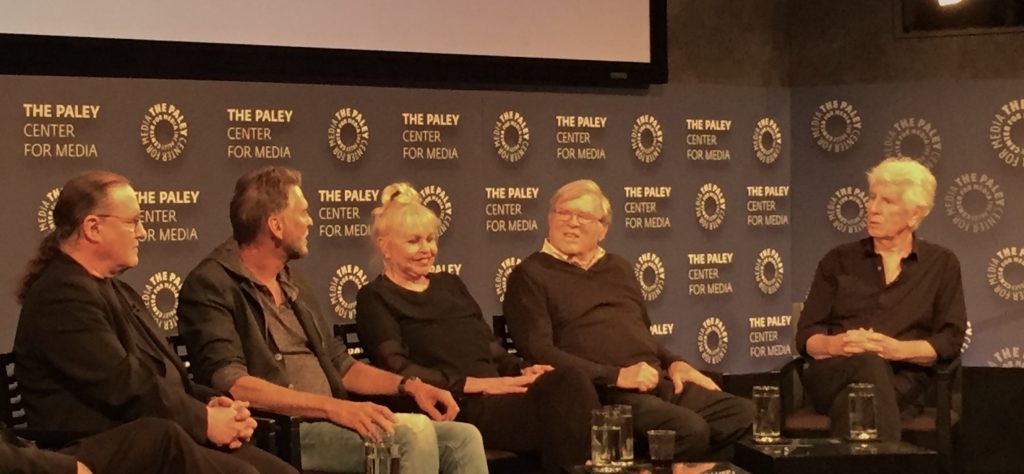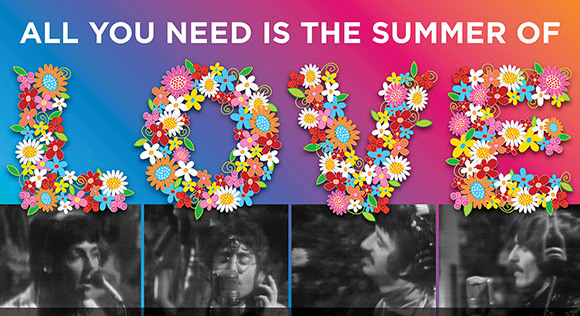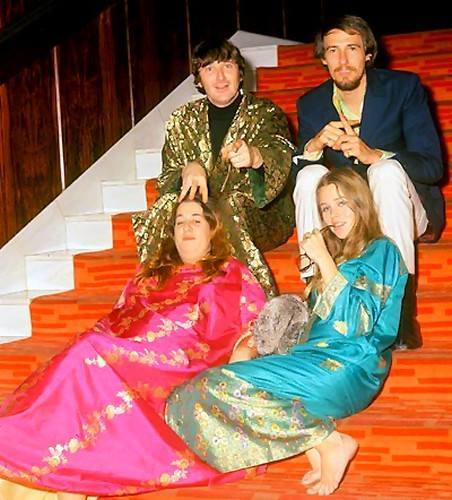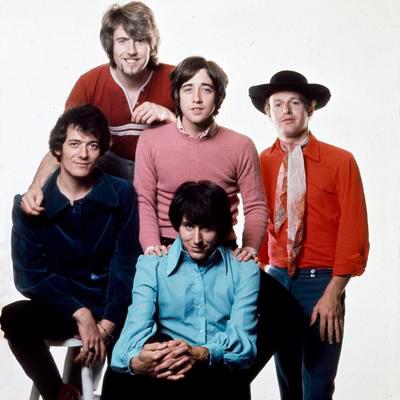
Everyone who is still breathing and of a certain age remembers the Summer of Love—1967—as a pivotal cultural marker, but what was it like to be a key player in the midst of it all?
That was the premise behind a panel discussion, “All You Need is the Summer of Love,” that took place June 6, 2017, at the Paley Center in New York City. The event was moderated by Graham Nash, who was still in the Hollies at the time, and included Michelle Phillips, the only surviving member of the Mamas and the Papas, and documentary filmmaker D.A. Pennebaker, whose Monterey Pop captured the seminal three-day festival of that June.
Also joining in were Kenny Loggins, who attended Monterey Pop but would not become a star himself until the early ’70s, and Allan Kozinn, a music journalist for the Wall Street Journal and an acknowledged Beatles expert.
 The evening began with some brief film snippets from Monterey Pop and other era performances, and the complete broadcast of the Beatles’ “All You Need is Love,” part of the June 25, 1967, Our World satellite broadcast, the first global telecast of its kind, which reached hundreds of millions of people. Later, Kozinn and Nash would piece together the background of the broadcast—how the song was written and rehearsed within a few weeks, trivia about the live broadcast itself (Why, Nash wondered, was John Lennon chewing gum as he sang?) and the state of the Beatles’ art at the time.
The evening began with some brief film snippets from Monterey Pop and other era performances, and the complete broadcast of the Beatles’ “All You Need is Love,” part of the June 25, 1967, Our World satellite broadcast, the first global telecast of its kind, which reached hundreds of millions of people. Later, Kozinn and Nash would piece together the background of the broadcast—how the song was written and rehearsed within a few weeks, trivia about the live broadcast itself (Why, Nash wondered, was John Lennon chewing gum as he sang?) and the state of the Beatles’ art at the time.

Nash, invited by Paul McCartney, was at the actual “All You Need is Love” telecast (“The only thing I regret is what I was wearing,” he said) and as an intro to the panel discussion he told of inviting the American group the Turtles to his apartment to hear Sgt. Pepper prior to its release—he’d been given a copy early. Needless to say, the visitors were knocked out.
Nash compared the era to Vienna and Paris at their artistic peaks and called the ’60s “an incredibly important time when we believed we could stop the war and change the world.”
Michelle Phillips also heard Pepper before the rest of us did. Musing about the ceaselessly creative Beatles she said, “I knew it would never stop…We were always trying to catch up to them.”
Loggins was just another teenage rock fan in 1967. “Sgt. Pepper and marijuana happened at the same time,” he remembered. One day in 1967 he caught a ride up the coast from L.A. with some friends who said they were heading to Monterey. They neglected to mention that they were hoping to hear some music when they arrived. Loggins attended the festival and saw most of the now-legendary performances.
“You didn’t know how incredible it all was until you look back, how lucky we were,” added Nash.
Watch the Mamas and the Papas sing “Got a Feelin'” at the Monterey Pop Festival
The artists did not take a long view at the time, said Phillips. People often ask her if the Mamas and the Papas knew they were creating masterpieces. “We didn’t even know if a record was going to be released!” she said. She told a story of the group’s Mama Cass Elliot introducing her to Cass’ friend Graham—Nash, of course. Cass also introduced Nash to a fellow from the Byrds named David Crosby. Nash went to visit Crosby at his friend Joni Mitchell’s place one day and heard the soon-to-be-former-Byrd harmonizing on a new song with Stephen Stills of Buffalo Springfield, a group that was also coming to its end. Nash asked them to repeat the song a few times and then joined in on harmonies. Nash went back to England, left his band, left behind most of his belongings and moved to Los Angeles. We all know what happened next.
Watch the entire “All You Need is the Summer of Love” panel discussion on Facebook.

The floor was opened up to questions after that anecdote, which led to all sorts of revelations from the assembled. On Monterey, Pennebaker—hired to film the festival—recalled spending a week prior to the event discussing ideas with the Mamas and the Papas’ John Phillips, one of the organizers.
Michelle recalled Indian sitar master Ravi Shankar’s set as being particularly special, his hold over the crowd. “He asked everyone not to smoke,” she said, “not just pot but cigarettes too. And nobody smoked.”
Nash, who was not at Monterey (“We weren’t invited”) but did play Woodstock a couple of years later with CSN&Y, quipped that one of the people he had his eyes on during that time was Michelle herself. “Everyone with blood in their veins wanted Michelle,” he said.
For Loggins, the San Francisco band Moby Grape—with its three-guitar front line and multiple vocals—was a highlight. Their presentation, showier than most of the other new Bay Area bands, provided him with a lesson on how to work the stage.
One of the evening’s biggest laugh-getters came via Nash. Asked by an audience member how important drugs were to the creative process, Nash deadpanned that he had no way of knowing because “I was always stoned.”
Fifty years is a long time, but stories of that heady time period—even the ones we’ve all heard before—never seem to get old. To wrap up the evening, we were shown a colorized version of the same June 1967 “All You Need is Love” broadcast that had been screened earlier. It really made no difference. As Nash said at one point, “That whole time was very much in vivid colors.”
[easy_sign_up title=”Sign up for the Best Classic Bands Newsletter”]
- Over Under Sideways Down: Making Sense of the Yardbirds’ Album Releases - 05/27/2024
- 17 Classic Chuck Berry Covers - 05/18/2024
- ‘Brandy’ by Looking Glass (It’s a Fine Song) - 05/18/2024


4 Comments
“most people with blood in their viens wanted michelle “…ha !! a lot of them did have her
I was 15. The AM radio was all there was, unless you knew the already great groups were worth buying records by. You knew that from our older teenagers, brothers and sisters who were Hip. If the bands were on Ed Sullivan, you knew they were great too. We always played the albums whole sides too. I played drums in a basement- band, creating our “covers” of the Great (easy to play) tunes. Won the Battle of the Bands in our HS gym ! Excellent times man.
I love that clip of the Mamas and Papas. John Phillips will always be remembered as best dipshit hat award winner.
Always nice to hear millionaire’s perspective on how they made their millions. ;>)